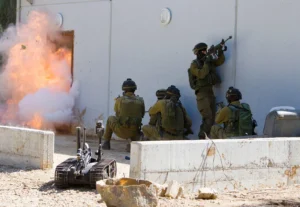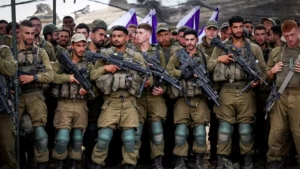
Israel Defense Minister: No More Military Raids in Gaza
Kofi Acquah, 11:49am,16 April 2025; 3 minute read
Israel’s Defense Minister Israel Katz declared Wednesday the military has shifted its strategy in Gaza, from conducting temporary raids toward capturing territory with the goal of creating permanent buffer zones.
The announcement was issued in a detailed statement, parts of which drew criticism from various sides, prompting a quick clarification from Katz.
“Unlike in the past, the IDF does not evacuate areas that were cleared and captured,” Katz said, explaining “the IDF will remain in the security zones as a buffer between the enemy and the communities in any temporary or permanent reality in Gaza – like in Lebanon and Syria.”
“Until today, hundreds of thousands of residents have evacuated and tens of percent of the area has been added to the security zones,” he added.
Katz’s announcement drew criticism from both coalition and opposition leaders, as well as hostage families, criticizing not only the declaration of a strategic shift but also a passage that appeared to signal the resumption of humanitarian aid.

Within an hour of publishing the original statement, Katz was forced to issue a clarification that “no humanitarian aid is going to enter Gaza.”
While listing several components of Israel’s “clear and unequivocal” policy in Gaza, Katz mentioned “Stopping humanitarian aid that harms Hamas’s control over the population and creating infrastructure for distribution via civilian companies later on.”
Among those criticizing Katz was the Hostages and Missing Families Forum, which derided the statement as “many empty words and promises” and called the plan an “illusion.”
“They promised that the hostages come first. In practice, Israel is choosing to seize territory over the abductees. They promised that the ‘gates of hell’ would open. In practice, preparations are being made quietly to resume humanitarian aid.”
“It is impossible to continue the war and at the same time release all the hostages,” the forum said, demanding an agreement, “even at the cost of ending the war.”
Katz also came under fire from leaders on both sides of the political divide.
Yisrael Beytenu chairman, Avigdor Liberman, who represents the opposition, called Katz’s alleged plans to renew the aid a surrender.
“At a time when our hostages are starved in tunnels, residents of the south are running to bomb shelters during a holiday, the government of Israel surrenders again and intends to bring humanitarian aid to Gaza. This cannot be allowed to happen,” Liberman wrote on 𝕏.
Meanwhile, National Security Minister Itamar Ben Gvir vowed to do everything he could to stop the “historic mistake” of resuming aid deliveries.
“It’s a shame we don’t learn from our mistakes. As long as our hostages are dying in the tunnels, there is no reason for a gram of food or aid to enter Gaza,” Ben Gvir wrote on 𝕏.
In his clarification, Katz said it was “a shame” that some tried to mislead by misinterpreting his words.
“The prevention of humanitarian aid to Gaza is one of the central pressure tools that prevents Hamas from using the same measure against the population,” Katz explained.

“No one, under the current reality, is going to bring in any humanitarian aid to Gaza, and there is no preparation for the entry of any such aid. I emphasized that regarding the future, a mechanism should be built using civilian companies as a tool that will not allow Hamas access to the matter, also for the future.”
In addition to the controversial parts of the original statement, Katz said that Israel continues to insist on the Witkoff proposal for a new hostage deal, while keeping up the military pressure.
Somewhat contradicting Katz’s statements, several Israeli media reports in recent weeks have indicated that the pace of military operations in Gaza is relatively slow at the moment, despite previous reports that a big offensive was being planned.
Nevertheless, IDF sources estimate that Israeli troops currently control about 30% of the enclave.
According to Katz, the IDF is evacuating the Gazan population from combat zones while “softening the area with immense force from the air, land, and sea, accompanied by heavy tools for dealing with explosives and destruction of threatening buildings – for the protection of the maneuvering forces.”
“The safety of our soldiers is, in our eyes, the highest-priority mission,” he stressed. Captured areas are then attached “to the security zones of Israel for the defense of the communities… In parallel, the plan is being advanced for voluntary relocation for the residents of Gaza.”
Katz also noted, as a result of the current pressure, “For the first time, the Egyptians have made the disarmament of Hamas and the demilitarization of Gaza a condition for a comprehensive deal and for ending the war.”




